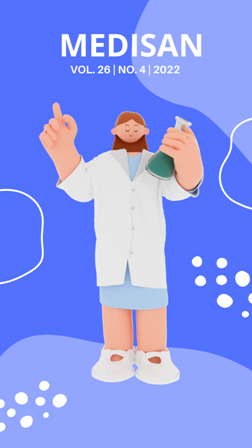Gestión de información en procesos académicos y asistenciales a través de la nube Infomed Santiago
Palabras clave:
nube computacional, gestión de información, COVID-19, proceso asistencial, proceso académico.Resumen
Introducción: La gestión de información agiliza los procesos en diferentes ambientes laborales, para lo cual se emplean sistemas capaces de reunir, organizar y vincular la información almacenada. La nube se basa en tecnologías existentes, tales como virtualización y servicios web; constituye un hito informático y se adapta a diversos escenarios y contextos.
Objetivo: Contribuir a la gestión de información relacionada con las bases de datos de la reacción en cadena de la polimerasa y los procesos de acreditación en la Universidad de Ciencias Médicas de Santiago de Cuba a través de la nube Infomed Santiago.
Métodos: Se realizó una investigación aplicada de desarrollo tecnológico en el Centro Provincial de Información de Ciencias Médicas, la Universidad de Ciencias Médicas y el Centro Provincial de Higiene, Epidemiología y Microbiología de Santiago de Cuba, desde junio hasta diciembre del 2021. Se aplicaron encuestas a 19 profesionales del sector, quienes laboraban directamente en la gestión de información relacionada con las bases de datos antes citadas.
Resultados: Los 19 encuestados (100,0 %) afirmaron que utilizaban el correo electrónico, el chat integrado, la nube y otras facilidades que esta herramienta ofrece para almacenar y compartir información.
Conclusiones: La nube permitió la gestión de información relacionada con los procesos asistenciales y académicos durante el periodo más crítico de la COVID-19.
Descargas
Citas
2. Ponjuán Dante G. La gestión de información y sus modelos representativos. Valoraciones. Cienc Inform. 2011 [citado 07/12/ 2021]; 42(2):11-7. Disponible en: https://www.redalyc.org/pdf/1814/181422294003.pdf
3. Vidal Ledo MJ, Araña Pérez AB. Gestión de la información y el conocimiento. Revista Cubana de Educación Médica Superior. 2012 [citado 25/10/2021]; 26(3):474-84. Disponible en: https://www.medigraphic.com/pdfs/educacion/cem-2012/cem123m.pdf
4. Barrientos Rodríguez M, Castro Peraza MA, Zaaca González G, Álvarez Gainza D. Sistema web para la gestión de los programas de maestrías del Instituto “Pedro Kourí”. Rev. cuba. inform. méd. 2022 [citado 20/02/2022]; 14(1):e468. Disponible en: http://revinformatica.sld.cu/index.php/rcim/article/view/468/pdf
5. Garcés Suárez E, Garcés Suárez E, Alcívar Fajardo O. Las tecnologías de la información en el cambio de la educación superior en el siglo XXI: reflexiones para la práctica. Revista Universidad y Sociedad. 2016 [citado 26/11/2021]; 8(4): 171-7. Disponible en: https://rus.ucf.edu.cu/index.php/rus/article/view/480
6. ¿Qué es la red Infomed? Infomed. Portal de la Red de Salud de Cuba [citado 23/05/2022]. Disponible en: https://www.sld.cu/acerca-de/
7. Llanusa Ruiz SB, Rojo Pérez N, Caraballoso Hernández M, Capote Mir R, Pérez Piñero J. Las tecnologías de información y comunicación y la gestión del conocimiento en el sector salud. Rev. cuba. salud pública. 2005 [citado 26/11/2021]; 31(3). Disponible en: https://www.redalyc.org/articulo.oa?id=21431308
8. Domínguez Alonso E, Zacea E. Sistema de salud de Cuba. Salud pública Méx. 2011 [citado 26/11/2021]; 53 (supl 2). Disponible en: http://www.scielo.org.mx/scielo.php?pid=S0036-36342011000800012&script=sci_arttext
9. Rueda López JJ. La tecnología en la sociedad del siglo XXI: albores de una nueva revolución industrial. Aposta. Revista de Ciencias Sociales. 2007 [citado 25/10/2021]; (32): 1-28. Disponible en: https://www.redalyc.org/pdf/4959/495950225001.pdf
10. Muñoz Cáceres MD, Aguado García D, Lucía B. El largo camino hacia la gestión del conocimiento. Revista de Psicología del Trabajo y de las Organizaciones. 2003 [citado 07/12/2021]; 19 (2): 199-214. Disponible en: https://www.redalyc.org/pdf/2313/231318052005.pdf
11. García Álvarez MT, Pineiro Villaverde G, Varela Candamio L. Proposal of a Knowledge Management Model and Virtual Educational Environment in the Degree of Law-Business. Advances in Intelligent Systems and Computing. 2018 [citado 25/10/2021]; 746: 1275-86. Disponible en: https://link.springer.com/chapter/10.1007/978-3-319-77712-2_122
Publicado
Cómo citar
Número
Sección
Licencia
Esta revista provee acceso libre e inmediato a su contenido bajo el principio de que hacer disponible gratuitamente investigación al público, apoya aún más el intercambio de conocimiento global. Esto significa que los autores/as conservarán sus derechos de autor y garantizarán a la revista el derecho de primera publicación de su obra, el cuál estará simultáneamente sujeto a la licencia internacional Creative Commons Atribución 4.0 que permite copiar y redistribuir el material en cualquier medio o formato para cualquier propósito, incluso comercialmente, además de remezclar, transformar y construir a partir del material para cualquier propósito.





